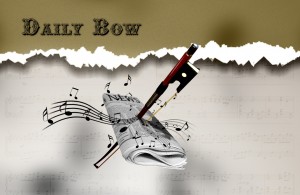 With the news yesterday of jazz legend Dave Brubeck passing away, it seemed fitting that today’s Daily Bow have something to do with jazz.
With the news yesterday of jazz legend Dave Brubeck passing away, it seemed fitting that today’s Daily Bow have something to do with jazz.
A couple weeks ago I came across a piece titled “Jazz leadership is needed.” Intrigued by the title, I read through the short opinion piece. What I found was quite interesting…
What kind of leadership is needed in the world today? I would like to use the musical world to contrast the different styles of leadership currently in place.
In classical music, the music score plays a pivotal role in the delivery of the music. Musicians are trained on how to read the music and to also play it precisely. The conductor or the solo instrumentalist is a key driver on the interpretation of the music dynamics in terms of the volume of the sounds, the tempo and the different accents on certain parts of the music.
…
On the other extreme you have genres such as folk music or struggle songs, where precision is not a key requirement. Anything goes when singing folk or struggle songs because the music is intended for the greater purpose of uniting the community or fighting for a cause. The music is not produced for the inherent enjoyment and appreciation of the music.
…
When you apply this analogy to the current environments in developed and developing countries, you have a conflict between the two environments, which are not integrating very well.
As I read through the author’s writing, I was fascinated by the way he set jazz in the context of the social, political, and economic disparities between the developed and the developing world.
The classical music world is mostly akin to the developed world where investors appreciate certainty and predictability. This is a world where skills are critical and there are clear distinctions of superiority based on skills and class. This is where the rules are absolute and everyone respects these rules.
However, the interpretation of these absolute rules is quite relative, which is great business for lawyers who are able to help with interpretations that can ultimately be adjudicated by the courts of law. There is generally good progress in terms of material goods and services, but may be backward in terms of spiritual progress and other intangible qualities.
On the other end of the spectrum, you have the developing world environments that correspond to the folk and struggle song genres, where the rule of law is relative and flexibility reigns supreme. There is no certainty and predictability.
The skill levels do not matter because the key is to ensure inclusivity and that the community spirit is maintained. There is no progress in terms of material goods and services, but there is an overwhelming goodwill and spiritual depth within the people living in these environments.
…What is needed is the third wave of leadership that transcends both the classical and the folk/struggle world. The answer lies in jazz leadership.
The author’s conclusion is that jazz leadership is needed to bridge the divide, both in music and in the world. Writing as someone living in South Africa, where both environments co-exist somewhat precariously, I can understand how this perspective could come about. I think it is too much to try and take this analogy to a practical point for solving the world’s problems.
That said, there is an important lesson that jazz leadership here can teach classical music. As the author notes, “jazz is characterized by a deep theoretical understanding of music, which is coupled with great room for improvisation.” Classical should also be (though often isn’t) based on this deep theoretical understanding. That provides the foundation to truly grow as a musician.
While classical cannot allow for that same level of improvisation, the ability to be flexible and adaptable is needed for the classical genre as a whole. As a movement, classical must be able to respond to and go with changing circumstances. It must also be able to create distinct experiences for its listeners, so that no two classical performances are the same.
The author writes that “no performance is the same in jazz because the present circumstances are always taken into account in the rendition of the music.” There is no reason that classical music cannot also be that way. Although the notes do not change, the feeling that the music evokes and the experience that the music creates should change from concert to concert.
Many of our recent articles have looked at groups doing such things, creating unique musical experiences every time they give a performance: whether it’s Classical Reinvention or “Classical Remixing.”
Still, more is needed, and on a more widespread scale to truly make an impact. It’s inspiring, then, to see jazz artists showing a “classical” side, as Branford Marsalis recently did.
A proud family member of a New Orelans jazz dynasty that includes his brother and famed teacher Wynton Marsalis, Branford recently gave a short Q&A session where he showed that he is “as comfortable discussing Shostakovich as he is Miles Davis.” He is a creative director for the Cincinnati Symphony Orchestra’s 5-concert “Ascent Series.” Below is a video of a surprise performance he gave in Downtown Cincinnati last month as part of his residency week.
Read the full article on Q&A – Branford Marsalis shows classical side














No comments yet.